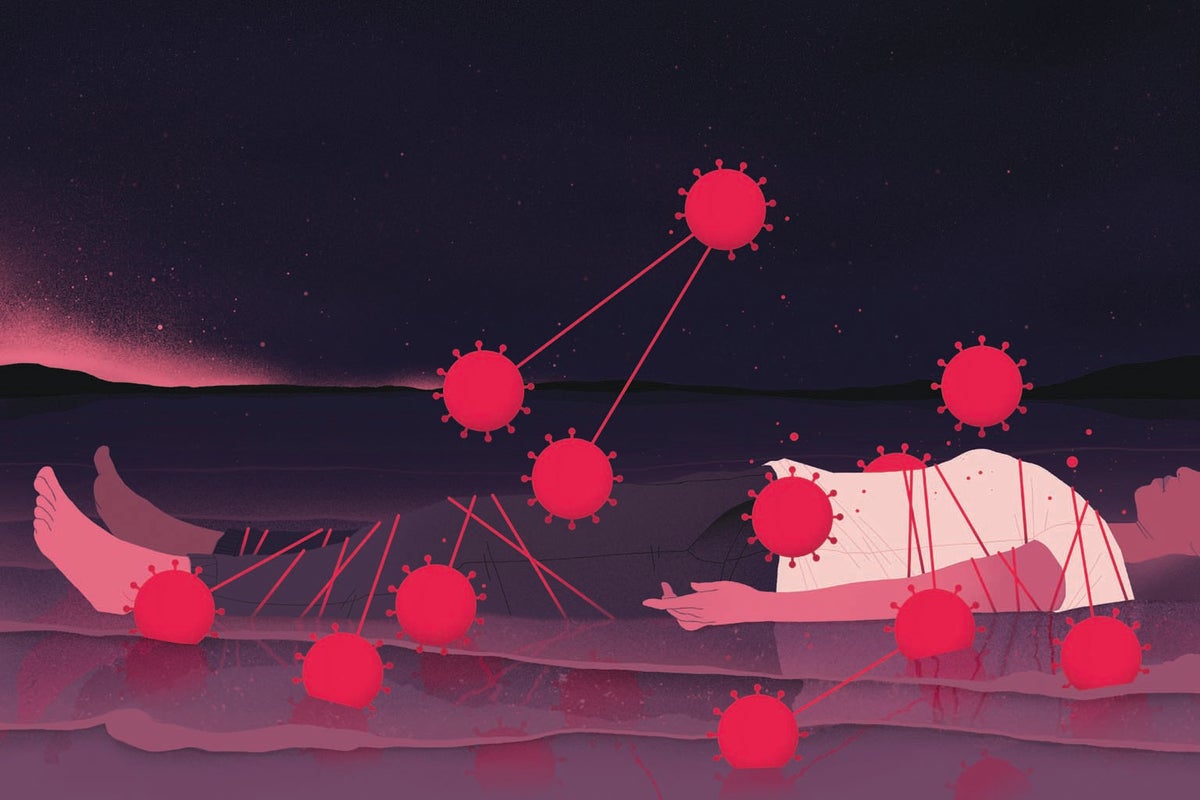Core Concepts
Long COVID is now recognized as a neurological disease with persistent symptoms affecting millions, leading to the need for specialized treatments focusing on neurological dysfunction.
Abstract
Tara Ghormley's experience highlights the debilitating effects of long COVID, where neurological symptoms persist years after infection. The condition, known as postacute sequelae of COVID-19 (PASC), affects over 15 million adults in the U.S., causing pain, fatigue, and cognitive impairment. Research indicates that long COVID may stem from nerve dysfunction in the autonomic nervous system, leading to various symptoms like brain fog and postexertional malaise. The syndrome poses challenges for diagnosis and treatment due to its complex nature involving inflammation and potential viral persistence in the body. Medical professionals are adopting a multidisciplinary approach to address the diverse symptoms of long COVID, emphasizing personalized care and ongoing research to improve patient outcomes.
Long COVID Now Looks like a Neurological Disease, Helping Doctors to Focus Treatments
Stats
As of March 2023, long COVID was estimated to affect more than 15 million adults in the U.S.
A meta-analysis suggested that worldwide, 43% of people infected with SARS-CoV-2 may develop long COVID.
Studies indicated that between two million and four million Americans were forced out of the workforce due to long COVID.
Quotes
"I now think of COVID as a neurological disease as much as I think of it as a pulmonary disease." - William Pittman
"This is not a psychological or psychosomatic disorder; this is a neuroimmune disorder." - Joanna Hellmuth
"People will continue to develop long COVID... We're going to be addressing this for probably decades." - Nisha Viswanathan
Key Insights Distilled From
by Stephani Sut... at www.scientificamerican.c... 02-21-2024
https://www.scientificamerican.com/article/long-covid-now-looks-like-a-neurological-disease-helping-doctors-to-focus-treatments1/
Deeper Inquiries
How can medical professionals differentiate between autoimmune components and viral persistence in treating long COVID?
In treating long COVID, distinguishing between autoimmune components and viral persistence is crucial for effective management. Medical professionals can differentiate between these two aspects through various diagnostic approaches.
Autoimmune Components:
Autoantibodies: Testing for autoantibodies that interact with nerve cells can indicate an autoimmune response.
Immune Markers: Elevated levels of specific immune markers like tumor necrosis factor alpha, interleukin 6, and interferon beta may suggest an autoimmune component.
Response to Treatments: Patients responding well to therapies targeting autoimmunity, such as IVIg or rituximab, could indicate the presence of autoimmune processes.
Viral Persistence:
Viral Proteins Detection: Finding viral proteins or particles in body tissues post-infection suggests viral persistence.
Longitudinal Studies: Monitoring patients over time to observe if symptoms persist even after the virus has cleared from the body.
Antiviral Therapies: Administering antiviral medications like Paxlovid and assessing their impact on neurological symptoms can provide insights into viral clearance.
By utilizing a combination of these methods along with detailed patient histories and symptom profiles, medical professionals can better understand whether the lingering symptoms in long COVID patients stem from autoimmune responses or persistent viral elements.
How does societal dismissal impact patients suffering from long COVID symptoms?
Societal dismissal of patients experiencing long COVID symptoms exacerbates their already challenging situation in several ways:
Validation: When individuals are dismissed by society or healthcare providers regarding their symptoms, they often feel invalidated and unheard. This lack of validation contributes to increased distress and feelings of isolation among sufferers.
Delayed Treatment: Societal dismissal may lead to delays in diagnosis and treatment for those with long COVID. Without proper recognition of their condition, patients might not receive timely interventions that could alleviate their suffering.
Mental Health Impact: Being dismissed by society adds another layer of mental health burden on top of physical ailments. Patients may experience heightened anxiety, depression, or feelings of hopelessness due to societal disbelief about their condition.
Quality of Life: The overall quality of life for individuals dealing with long COVID is significantly affected by societal dismissal. Lack of understanding or support from others hampers recovery efforts and makes it harder for patients to cope with ongoing challenges.
Stigmatization: Dismissal can also lead to stigmatization where individuals feel judged or marginalized because others do not believe in the legitimacy of their illness.
How might insights gained from studying long COVID contribute to understanding other postviral syndromes like ME/CFS?
Insights obtained from studying long COVID have the potential to enhance our comprehension and management strategies for other postviral syndromes such as Myalgic Encephalomyelitis/Chronic Fatigue Syndrome (ME/CFS) in several ways:
Mechanistic Understanding: By unraveling the mechanisms underlying how viruses trigger prolonged health issues as seen in long COVID cases, researchers gain valuable knowledge applicable across different postviral conditions including ME/CFS.
2 .Treatment Approaches: Discoveries made while investigating treatments for neurological manifestations observed in long-haulers could be extrapolated towards improving therapeutic options for ME/CFS patients who exhibit similar cognitive dysfunction patterns.
3 .Immune System Dysregulation Insights: Findings related to immune system dysregulation observed during studies on autoimmunity versus persistent infection dynamics within individuals recovering from SARS-CoV-2 infections offer critical information beneficial when examining similar immunological irregularities present among ME/CFS populations following prior infections
4 .Early Intervention Strategies: Early identification protocols developed based on monitoring early-stage presentations associated with developing chronic conditions like ME/CFS subsequent acute illnesses enable prompt intervention implementation before severe complications arise
5 .Research Advancements: Advances achieved through dedicated research initiatives focused on uncovering pathophysiological links connecting extended illness durations following initial infections pave way towards broader scientific advancements benefiting diverse patient groups grappling with comparable protracted health challenges
0
